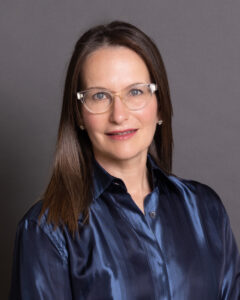For 95 years, Lead Bank has been a fixture in the Kansas City area. While it’s had changes — in ownership, in direction, in growth — in those many decades, its latest iteration has a lot more percolating under the surface.
The new Lead Bank is still very much a community institution where someone who lives and works in Kansas City, Mo., can cash a check or get a loan, personally or for their business. It has also broadened previous leadership’s existing moves into fintech to make technology another principal focus, particularly in banking-as-a-service.
New ownership has been in place for about 16 months now, with leaders of the new version of Lead Bank coming from the mobile payment company Block (formerly Square).
Inside its walls, tech-oriented new leadership pairs with previous banking staff who’ve been brought up to speed on the new vision, which began with CEO and Chair Jackie Reses’ personal pain points as a customer.

“I started as a customer of banks that provided services to fintechs while I was at Square,” Reses said. “And as a customer of those banks, I felt an extreme level of pain when trying to build products that should otherwise be easy to bring to market, or not easy but they should be executable in bringing them to market.”
While at Square, Reses said, she had a vision for starting a bank to give a company like Square the skills, expertise and infrastructure to be able to build those products. “I went down this path with a vision to go build a bank,” Reses said. “I did not realize how hard that would be and how unusual that would be while going through this process.”
While building this new banking vision, leaders were also incorporating an existing bank that had made its own forays into the fintech world while serving as a longstanding community institution.
“At Lead Bank, we don’t have a separation between what we’re doing on banking-as-a-service and what we’re doing on the traditional community bank,” said Erica Khalili, co-founder and chief legal and risk officer.
“We are one company and, yes, we have teams that are more focused on lending products, et cetera, in the Kansas City metro area, but we’re seeing those touch points across all of our different business verticals here,” Khalili said.
They’re also seeing how some of their fintech strategic partnerships have big concentrations in the Kansas City metro area and how they can then use that data and be helpful for CRA purposes and reinvest in the community, Khalili said.

“And we’re also seeing it as a way that we can bring more jobs and more tech focus to the Kansas City area,” Khalili added.
Blending styles
When they arrived last summer, new leadership wanted to set the tone for Lead’s transformation. While the charter is the same, they regard themselves as the founders of Lead Bank 2.0, although they’re approaching it as a hybrid of old and new. When they began looking for the right bank to acquire, they wanted one that already had a “platinum-level patina,” Reses said.
It needed to have a strong rapport with regulators who could be good partners in what they were trying to build. It also needed an “open-minded and agile employee base that wanted to be part of a growing company and wanted to be part of this mission to change the way banking is done in the United States,” Reses said. “And Lead 100 percent fit that bill.”
Reses characterizes the melding of the groups as starting with a bank that had a forward-leaning culture, with a team that was creative and open-minded while also being deeply technical. Add to that engineering and technical product expertise, as well as A-list executive talent from around the country, and you’ve got the current iteration.
Lead Bank already had a foundational group of successful customers, Reses said.
They added more similarly successful local business, while burnishing that with more fintechs. In that domain, Lead was already working with Self Lender, which offers credit-building loans, among others.
“It doesn’t matter whether you walk in the door and are greeted by the folks in Kansas City. It doesn’t matter whether it’s changing the app that our local customers work with in order to do wires and bank transfers. Or it doesn’t matter whether you’re one of the largest fintechs in the world,” Reses said. “They see the level of care, design and expertise we’re applying to the products that we’re building and they’re excited by it.”
Among Lead Bank’s strategies for building its workforce is recruiting at the University of Kansas and other local colleges, to take advantage of local talent, Khalili said.
“I think maybe the Midwest gets overlooked a little bit,” Khalili said. “But we’re definitely double-clicked and we’re very, very invested in growing out our headcount and presence in the area.”
There certainly are people on the team whose job functions face just community banking or just BaaS, she said. “But there are so many people who are just learning and growing. And that’s why we also really foster a culture where we have a lot of internal mobility and cross-training because there are jobs that people didn’t even know were available or what they were that they’re really leaning into and getting excited about,” Khalili said.
Among the leadership are the four co-founders who all previously worked at Block: Reses, Khalili, Chief Technology Officer Ronak Vyas and Chief Product & Data Science Officer Homam Maalouf. Joining that quartet are CFO Kris Dickson, who was previously at Lehman Brothers Holdings and Chief Design Officer Albert Song, who was at Meta (formerly Facebook). The team is rounded out by three leaders from the old Lead Bank: President and Chief Lending Officer Greg Bynum, Chief Operating Officer Brooke Clouse and Chief People & Experiences Officer Angela Blackburn.
Beefing up BaaS
For Lead Bank, the concept of BaaS is the idea that it develops embedded financial products for companies that are not banks, Reses noted. This can help both big consumer companies and fintechs without banking licenses.
“Anyone who needs that level of expertise, the regulatory experience, the compliance experience, the connectivity and relationship … can deploy that by working with a partner like us in order to help build the products on top of our rails,” Reses said.
Khalili noted that Lead had been involved in BaaS for several years prior to the acquisition.
“They had these footprints around the risk and compliance structures. They had some familiarity, as did their regulators, with how these models function,” Khalili said.
In terms of BaaS, Lead’s leadership has focused on the technology platform they’re building. Lead highlights these services on its newly redesigned website, calling itself, “a bank that moves at the speed of fintech.”
Among the services it offers are capital markets lending and loan origination with customized national lending programs. Clients can access personalized credit and debit card programs and APIs that allow for on-ramps and off-ramps into the banking system. Those using these services can also speed real-time transactions through FedNow.
Navigating the transition
David Block, president and partner of Block and Company, Inc., Realtors in Kansas City, is one of the customers who’s made the transition from the old to the new Lead Bank. Block said he’s banked with Lead for more than 10 years, forging a very strong relationship with the previous ownership, which was a good resource for commercial real estate lending.
The old Lead had a good grasp on the market and valuations. It moved quickly, Block said. “The new ownership of the bank, it’s been probably one of the best transitions I’ve ever seen,” Block said, continuing to be a satisfied customer even with the changes.
He noted the blend of the old and new teams, calling it a welcome strategy. “The bank is working on growing its portfolio across the board,” Block said, “which is going to enable larger opportunities for lending as it relates to real estate.”
Prior to the acquisition on Aug. 1, 2022, the Rowland family had been majority owners of Lead Bank for about 17 years. The family had lived in Kansas City for many years before Landon Rowland and his wife, Sarah, became bank owners.
The institution that began in 1928 as Garden City Bank, serving mostly agricultural interests, was struggling by 2005 when Josh Rowland joined his parents at the bank. In 2019, then the bank’s CEO and vice chair, Rowland told BankBeat that Lead had been growing 20 to 25 percent year-over-year for the previous five years. It had $275 million in assets.
At the end of the second quarter of 2023, Lead Bank had total assets of $952 million, with two branch offices in the Kansas City area and 145 full-time equivalent employees. It grew from $786 million in that same period in 2022, with 102 full-time equivalent employees. It also has offices in New York City and San Francisco.
Going forward, Reses said, the bank will be expanding who they’re talking to.
“I would say we’re going to continue to expand the set of technical products that we offer to our clients. We’ll continue to be a voice and employer in Kansas City. And we’ll continue to build a company from the bottom up, culture-wise, that we grow a great company and have people proud to work at Lead,” Reses said.
Continued growth is what the leaders are looking toward. Reses has lofty goals. She wants to do no less than change the way people bank in the United States.
“I love what we’re building and I feel like our clients love what we’re building, too,” Reses said.
